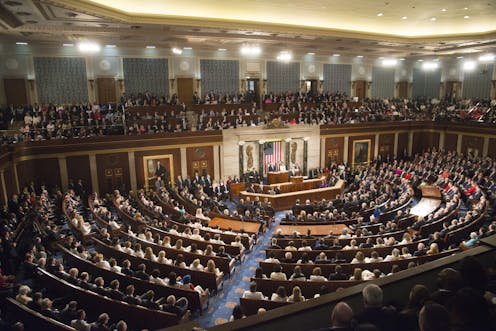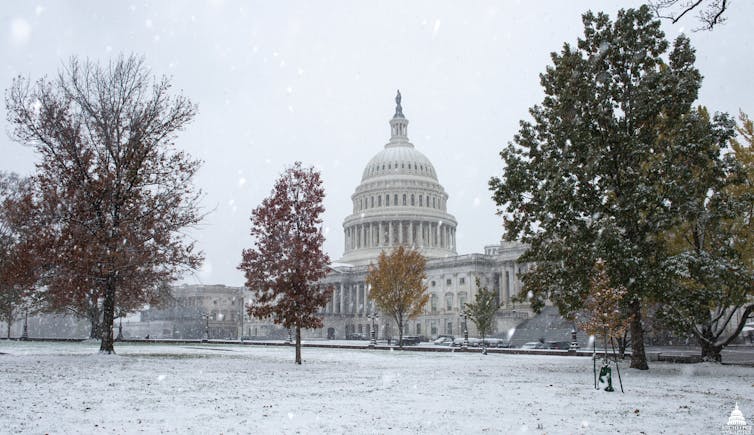Why Congress would keep working during a government shutdown
Even if other parts of the federal government shut down, Congress could – and would have to – keep working. A legal scholar explains why and how that is possible.

Unless Congress passes new spending legislation by December 20, at least some federal agencies may need to cease operations and shut down, just as several agencies did for a month around this time last year.
But if current budget negotiations to avoid a shutdown don’t pan out, at least one part of the government will keep running: Congress itself.
Depending on the exact terms of what is, and isn’t, funded during a shutdown, some congressional staff may need to stay home, and those staffers who keep working might not get paid until the shutdown ends.
Yet senators and representatives could keep working, handling impeachment and other duties – including budget deliberations to end the shutdown.
Congress controls spending
Under the Constitution, Congress holds what is called the “power of the purse.” That means the government can spend money only if a law passed by Congress allows the spending.
An important law called the Antideficiency Act reinforces this congressional power by barring government employees from spending or incurring obligations to spend federal money without a law providing the necessary funds. Government employees who break this law could be disciplined, fired or even fined or imprisoned.
Since the nation’s founding, Congress has generally passed laws appropriating funds for federal agencies that last only a year at a time. Congress adopted this practice from the British Parliament, which used time-limited spending bills to ensure that the king couldn’t go to war or undertake certain other activities without parliamentary support.
Today, annual spending laws similarly ensure that Congress can check and balance the power of the president and the executive branch. But this system creates a risk: If both houses of Congress and the president can’t agree on how much money the government should spend, and on what, existing funding might run out before new money is made available.
When that happens, federal agencies and programs that run out of money generally have to stop operating. The Antideficiency Act prevents them from continuing many of their functions while waiting for a new budget. (There are some exceptions, including one that allows certain activities related to protecting public safety and national security.)

Congress’ own expenses
What about Congress, though?
Congress and the president could avoid any disruption of Congress’ own operations by passing a law providing funds for the legislative branch, even if they can’t agree on funding for the rest of the government. Last year, a law funding the legislative branch passed before the shutdown, so Congress and its staff were unaffected.
Even if the law funding Congress expired, however, the legislative branch could keep working. Salaries for representatives and senators don’t depend on annual appropriations. Instead, a 1981 law established a permanent appropriation from which their salaries are paid, even if other federal spending has not been approved.
Even if that law were repealed, the representatives and senators themselves would still get paid for their work, though perhaps not until after the shutdown. Article I of the Constitution guarantees that “the Senators and Representatives shall receive a Compensation for their Services, to be ascertained by Law, and paid out of the Treasury of the United States.” The 27th Amendment further prevents any law from “varying” representatives’ and senators’ compensation until after an intervening House election. Though aimed principally at preventing representatives and senators from giving themselves a raise, the amendment could also prevent them from giving themselves a pay cut.
A limit to financial power
Whatever happens with congressional salaries, Congress’ work could continue.
Although Congress may limit many government activities by denying funding for them, lack of funding cannot prevent activities allowed by the Constitution that don’t require money in the first place.
As I explained in a recent research paper, Congress cannot prevent presidential pardons, vetoes or appointments by denying funding for them, because presidents don’t need any resources beyond their own salary to carry out these functions.
Similarly, a funding lapse should not prevent representatives and senators from discharging constitutional functions that they can carry out personally, such as considering and voting on legislation. Any other view would yield the absurd result that a shutdown could prevent Congress from voting on legislation to end the shutdown.

What about staff?
The elected officials in Congress may therefore continue to vote on legislation, debate bills and consider impeachment, among other things, even if other components of the government shut down.
But the question whether they can get help from their staff is more complicated. Staff salaries and other support expenses are subject to annual appropriations – not permanent ones like the one funding the representatives’ and senators’ own salaries.
The Government Accountability Office – an arm of Congress – has concluded, however, that legislative aides may keep working if their tasks are “necessary to assist the Congress in the performance of its constitutional duties.”
Along the same lines, the Department of Justice has ruled that executive branch employees may continue to perform work that is “necessarily incident to presidential initiatives undertaken within [the president’s] constitutional powers.”
The reasoning in these opinions is not airtight. The Constitution does not require the president, senators or representatives to have any staff at all – let alone some minimum “necessary” number. Nevertheless, the practice of allowing continued staff assistance for constitutional functions is sufficiently well established at this point that the Antideficiency Act should probably be understood to allow it.
The bottom line is that Congress itself can’t be shut down. Whatever happens in the coming weeks, Congress may proceed with impeaching the president and considering new legislation – including, Americans might hope, bills to end any government shutdown.
[ Like what you’ve read? Want more? Sign up for The Conversation’s daily newsletter. ]
Zachary Price is a registered Democrat and has contributed to and volunteered for the Democratic Party and some Democratic candidates. He worked for Representative Rush Holt in 1999-2000 and the U.S. Department of Justice from 2009-2012, but the views expressed here are the author’s own and do not necessarily reflect those of the U.S. government or any agency or official.
Read These Next
Massive US attacks on Iran unlikely to produce regime change in Tehran
President Trump has appealed to Iranians to topple their government, but a popular uprising is unlikely…
Iran will respond to US-Israeli strikes as existential threats to the regime – because they are
The latest attack on Iran goes far beyond previous operations by Israel and the US in both scale and…
Cuba’s speedboat shootout recalls long history of exile groups engaged in covert ops aimed at regime
From the 1960s onward, dissident Cubans in exile have sought to undermine the government in Havana −…





